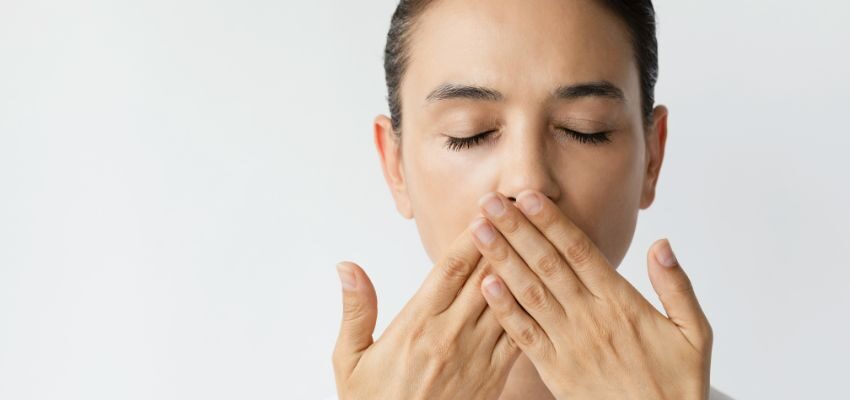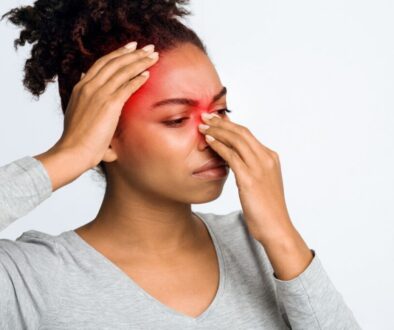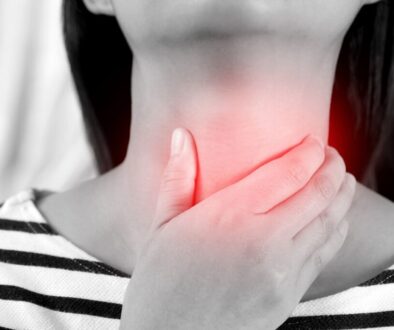Why Does Your Breath Stink In The Morning?

Published December 12, 2023
Have you ever had that awkward moment when your morning breath is really unpleasant? As you wake up, excited for the day ahead, you’re immediately hit with a terrible smell.
We’ve all been there. Chronic bad breath is one of the world’s most common oral health issues. The good news is it’s a manageable concern.
But before that, why does your breath stink in the morning?
According to science, a stinky morning breath is primarily caused by the build-up of bacteria in your mouth. These bacteria emit foul-smelling acids, making your breath smell like rotten eggs. A bacterial build-up can also cause various oral and digestive health issues affecting your breath’s odor.
But that’s only one of the core reasons you’re suffering from a stinky morning breath. Several factors can cause your breath to smell like a days-old trash bin.

Why Does Your Breath Stink In The Morning?
So, why does your breath stink when you wake up? Aside from bacteria build-up, the following can also cause bad breath not just in the morning but throughout the day:
1. Poor Dental Hygiene
If you’re wondering what causes morning breath, another common reason is poor dental hygiene. Not brushing your teeth regularly or using a mouthwash or floss can inevitably lead to bad breath.
As mentioned, bits and pieces of food can get stuck in your mouth. Without proper dental hygiene, those food pieces can stay there and continue feeding your mouth’s bacteria. Over time, plaque, a thin transparent film of bacteria, can also form around your teeth, making your breath stink even worse.
2. Foods
Sometimes, pieces of food can get stuck between teeth or in places toothbrushes can’t reach. When these break down, they serve as a meal for the bacteria in your mouth. This causes the bacteria to produce acids that give off a strong odor.
Eating certain types of food can also cause halitosis. Strong-smelling foods like onion and garlic might smell great on your food. But they contain sulfur compounds that, when mixed with bacteria, can give off a very foul odor.
Plus, when these foods are digested and absorbed into your bloodstream, they’re carried into your lungs. This gives you that distinctive breath that stays even hours after your meal.

3. Dry Mouth
Dry mouth is one of the usual culprits of stinky morning breaths. While sleeping, your mouth produces less saliva. If you didn’t know, your saliva is antimicrobial, and it helps kill the bacteria in your mouth. So, with less saliva, the bacteria can proliferate and build up in your mouth, causing bad breath.
Certain medical conditions can also cause a dry mouth. This includes autoimmune diseases, stroke, Alzheimer’s disease, and yeast infection. Snoring or sleeping with your mouth open can also dry it out.
4. Empty Stomach
Sleeping on an empty stomach can also cause you to wake up with a foul-smelling breath. That’s because insufficient food forces the body to use fat for energy. But breaking down fat also produces ketone, an acid emitting foul odor. This odor is then expelled into your breath, causing it to stink.
Not eating for prolonged periods also decreases your saliva flow. This dries up your mouth, which, as you know, can cause bad breath.
5. Periodontal Diseases
Bacteria build-up in the mouth produces plaque, which, in turn, irritates your mouth and leads to periodontal diseases.
Periodontal diseases can cause your gums to pull away from your teeth and rot when left untreated. As you can imagine, rotting gums don’t precisely make good-smelling breaths.
6. Acid Reflux
Gastroesophageal reflux disease (GERD) occurs when stomach acids, bile, and undigested food come back up into the esophagus. This leaves behind a bitter taste in your mouth and a foul-smelling breath.

7. Smoking
This one is pretty obvious. Smoking, especially tobacco products, not only gives you that characteristic smoke smell in your breath. It also dries out your mouth, making it more prone to gum diseases.
8. Mouth, Nose, and Throat Infections
Tonsil stones may also cause bad breath when covered with bacteria. The same is also true for chronic sinus and throat inflammations that cause post-nasal drip.
9. Others
Aside from the ones mentioned above, the following can also cause bad breath:
- constant dieting
- medications
- tooth decay
- alcohol use
- lack of regular dental cleanings
- cement washout in dental caps and crowns
You might have morning breath, but if it’s a problem all the time, it could mean tooth decay or gum disease. Regular dental check-ups and good oral hygiene help prevent these problems and minimize bad breath.
How to Prevent or Get Rid of Morning Breath
Since many factors can cause bad morning breath, the question that comes to mind is what helps bad breath? Remember that getting rid of it will depend on its underlying cause.

1. Better Oral Hygiene
In general, better oral hygiene remains the best antidote. As one of the home remedies for bad breath, brushing your teeth regularly, especially before you go to bed is a must. It can prevent the bacteria from proliferating in your mouth. Regular dental cleanings, flossing, and using mouthwash can all help, especially if you have orthodontic devices.
2. Lifestyle Changes
If you’re wondering how to get rid of bad breath permanently at home, specific lifestyle changes can also help you eliminate halitosis. For instance, if you’re a smoker, you need to quit smoking. Or, if you’re following a diet plan that requires you to starve yourself often, consider a healthier alternative.
3. Sugar-Free Gum
You can also try chewing sugar-free gum. It doesn’t contain sugar so that it won’t feed the bacteria in your mouth. Plus, the chewing action stimulates saliva production, killing the bacteria in your mouth. If you’re eager to know how to cure bad breath fast, consider having a pack of sugar-free gum available at all times.
4. Probiotics
As you know, the prime culprit for halitosis is bacteria. Harmful bacteria, to be specific. Probiotics, the good bacteria, can help restore the good balance of microorganisms in your mouth by eliminating the bad ones.
But ensure you’re taking probiotics specifically for oral health issues like halitosis. The most ideal ones are oral probiotic supplements like Bionaze, which also target ear, nose, and throat disorders.

5. Stay hydrated
Drink plenty of water, especially before bed. Doing so can help keep your mouth moist and prevent dry mouth, a common cause of bad breath in the morning.
6. Dental Procedures
If you have periodontal disease, you may need to schedule a visit to the dentist. In addition to deep cleaning, root planing or scaling treatments might be necessary. If your condition is severe, you may need surgery.
7. Acid-Reducing Medications
For GERD-induced halitosis, taking acid-reducing medications may also help with bad breath. Before you begin taking anything, consult your doctor.
Frequently Asked Questions About Bad Breath
1. Is it normal to have bad breath in the morning?
It’s normal to experience bad breath in the morning, commonly known as “morning breath.” During sleep, saliva production decreases and the mouth becomes dry, leading to this condition.
2. Why does my breath smell even after I brush my teeth?
If you brush your teeth well but still have bad breath, it might be because of bacteria in your mouth. The bacteria might be on your tongue or between your teeth. Inadequate oral hygiene practices may also exacerbate this concern. Sometimes, it may be a warning sign of advanced gum disease.
3. How do you know if your breath stinks?
To determine if your breath is unpleasant, do the wrist test. Try this simple self-test: lick your wrist, allow it to dry, and then take a whiff. This method provides a quick and convenient way to gauge the odor of your breath.
4. Can my breath smell without me knowing it?
It’s indeed possible for your breath to have an unpleasant odor without you realizing it. This is because we tend to get used to our scents. To solve bad breath problems, it’s best to schedule regular dental check-ups. These check-ups can help identify and resolve any underlying causes of halitosis.

Conquering Morning Breath For Good
The concern about why does your breath stink in the morning can be remedied with several measures. Getting rid of morning breath isn’t a challenging ordeal. If you take good care of your teeth and make healthy choices, you can prevent morning breath. Keep in mind your morning breath may be due to various factors. Luckily, you can enjoy fresh, confident mornings with the right strategies. Remember, fresh mornings are well within your grasp with the right approach.
Benefit From The Latest Advancements In Probiotic Science With Bionaze
Bionaze is a proprietary blend of probiotics proven to promote ear, nose, and throat health, improve digestion, and support your immune system. The active ingredients BLIS K12, and BL-04 are considered among the best probiotics according to science.
Get 25% Off Your First Order when you use BIO25 at checkout!

This Content Has Been Reviewed For Factual Accuracy
This content has undergone thorough fact-checking by our team of internal experts. Learn more about the meticulous editorial standard for our website here.
ADVERTISEMENT

About The Author
I am Tracy Gorman, a seasoned writer passionate about creating helpful content. I can delve into any niche and produce valuable articles with my expertise. Beyond writing, I am an avid learner with a passion for digital marketing. During my leisure time, I enjoy immersing myself in literature, experimenting with fashion, staying active, exploring culinary delights, indulging in movies, savoring music, and socializing. And, it’s safe to say, I love cats!




